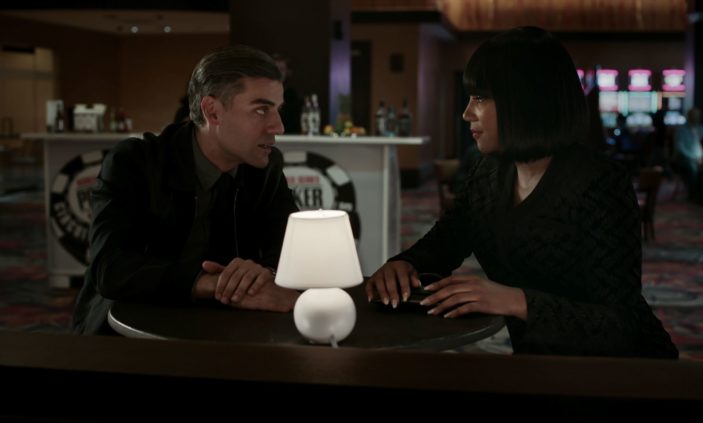
Kenny Rogers so famously told us “You gotta know when to fold ’em”, and in The Card Counter writer/director Paul Schrader seems unsure as to which hand he wants to confidently play. It’s not that this film is poorly made, nor is his commitment to the representation of desolation anything other than pure, but it’s such a bleak, repetitive effort that, conceptually, doesn’t feel uniform.
Though it’s titled “The Card Counter”, and, indeed, that’s what Oscar Isaac‘s William Tell – not his character’s real name, obviously – has mastered, his skills in this field are really only a surface level additive to an examination on the impacts of war crimes.
During opening narration, Tell informs us that he never thought he’d be OK in confinement, but when given a 10-year prison sentence, he found incarceration suited him quite well. It gave him time to read and count cards. The latter is predominantly what keeps Tell going in the present day, travelling from casino to casino, cashing in smaller pay days along the way; apparently, casinos accept the card counting mechanism if the stakes remain low.
His routine is disrupted however and his criminal past re-emerges when he meets Cirk (Tye Sheridan), a twentysomething whose father committed suicide off the abusive behaviour he witnessed as an Abu Ghraib guard. Tell and Cirk’s father’s pasts were intertwined, with Tell’s prison stint coming to light due to his own participation as a military guard in the notorious Abu Ghraib prison where torturing prisoners was a normality; these sequences, brought to nightmarish life with ultra-wide architecture lenses, proving The Card Counter‘s most exciting – however harrowing and near-nauseating they appear.
Cirk and Tell meeting is a plot convenience that is best left readily accepted, the two meeting at a security seminar overseen by Major John Gordo (a highly underused Willem Dafoe), the former Abu Ghraib leader who oversaw all the atrocities but never answered for any of his own crimes. Cirk has revenge on his mind, Tell – though not exactly against the idea of Gordo suffering – opts to take him under his wing, hoping the money he can secure during each card game will set Cirk up on a more enlightened path.
By no means is The Card Counter working with an uninteresting storyline, it’s just Schrader can’t seem to evoke much energy throughout. Isaac is as hypnotising as you’d expect, and his soft yet tense demeanour suits his damaged character perfectly, but his more reserved demeanour means the rather bland Cirk only appears more so. Sheridan is a capable young actor, but neither character is well served by Schrader’s script, making the idea that Tell would so drastically want to help someone he barely knows even harder to swallow.
The same mentality is extended to Tiffany Haddish as La Linda, a smooth talker in the industry who helps Tell find a bankroller for his competition pursuits. Whilst it’s a treat to see the usually hilarious, spit-fire actress change her tune, she doesn’t always appear comfortable on screen. Her miscasting and lack of chemistry with Isaac takes away from their own storyline, one supposedly built around their attraction towards each other.
Though the film’s darkness and tension will earn points with audiences appreciative of such character studies, and the haunting soundscape and Isaac’s performance are undeniably main points of a reserved recommendation, The Card Counter ultimately deals a hand that benefits the house more than the player.
![]()
![]()
![]()
![]()
![]()
TWO AND A HALF STARS (OUT OF FIVE)
The Card Counter is screening as part of this year’s Sydney Film Festival, which is being presented in-person and On Demand between November 3rd and 21st, 2021. For more information head to the official SFF page. The film is scheduled for a national release on December 2nd, 2021.
The Card Counter was originally reviewed as part of this year’s Brisbane International Film Festival coverage.
